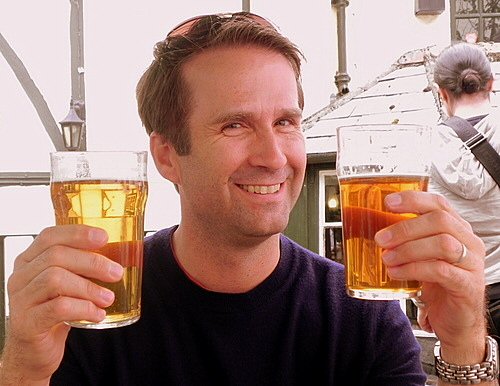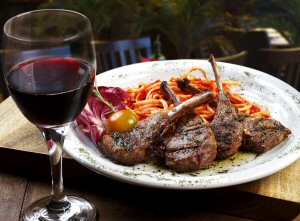Facts about Alcohol

It would be foolish to try to list all the beliefs, axioms, and explanations
put forth to justify drinking alcoholic beverages. The list is too long.
Alcoholic beverages are said to keep the drinker warm and to keep him cool; to
keep him awake, to help him sleep; to dull the senses, to make him more alert,
and sensitive; to make him feel like a man, to recapture youth; to allow
courage, to dull the sense of defeat; and on and on. We are told never to trust
a man who has been drinking, but we have also heard that we can find the real
truth when the teller is a little "tight."
Alcohol Makes A Person Warm. Is It True?
 As soon as alcohol has been absorbed
into the blood vessels they are dilated, thus permitting a larger quantity of
blood to reach the capillaries than would normally be the case. This causes the
face to flush and the skin to "feel" warm. An increased flow of perspiration may
follow. However, the warmth is in sensation, or feeling, only. The rate at which
heat is produced in the body is not increased, but the great flow of blood to
the skin does increase the loss of heat; so, physiologically, instead of being
warmer, the reverse is true. While one who has consumed alcohol may feel warmer,
he is really interfering with the natural thermostat which adjusts the heat of
his body. Instead of his getting warmer, more of his natural heat is being
drained away. As a consequence the use of alcoholic beverages by people exposed
to temperatures approximating freezing, or below, increases their danger or
succumbing to cold by their use of these beverages. As soon as alcohol has been absorbed
into the blood vessels they are dilated, thus permitting a larger quantity of
blood to reach the capillaries than would normally be the case. This causes the
face to flush and the skin to "feel" warm. An increased flow of perspiration may
follow. However, the warmth is in sensation, or feeling, only. The rate at which
heat is produced in the body is not increased, but the great flow of blood to
the skin does increase the loss of heat; so, physiologically, instead of being
warmer, the reverse is true. While one who has consumed alcohol may feel warmer,
he is really interfering with the natural thermostat which adjusts the heat of
his body. Instead of his getting warmer, more of his natural heat is being
drained away. As a consequence the use of alcoholic beverages by people exposed
to temperatures approximating freezing, or below, increases their danger or
succumbing to cold by their use of these beverages.
Does Alcohol Make A Person Braver?
After partaking of an alcoholic beverage,
a person may feel quite capable of doing many things. Some become very active
and excited. The controls which each person normally exercises over behavior
through good judgment as to what he should do or not do, or what risks he may
safely take, become unreliable and are at times disregarded. The person then
becomes foolhardy in his actions. He risks his life under circumstances that,
before his judgment was interfered with, he would have been quite unwilling to
do. There was a time in the early days of naval conflicts when "grog" (rum and
water mixed) was served to all on board when the decks were cleared for battle.
This "grog" was at times referred to as giving the men "Dutch" courage. It would
not make them braver but it would affect adversely their judgments as to what
risks should be taken, and acted as an anesthetic in case of minor injuries. It
made the fighters think they were fighting better, when they actually were not
fighting as well.
Does Alcohol Cure Snake Bites?
The use of alcohol internally as medicine was
originally based upon the idea that alcohol was a stimulant. In case of any
accident, including snake bite, it was administered to increase the strength of
the patient so that he could throw off the effects of the venom. This is now
known as false. Alcohol is a pain reliever and a depressant. If the patient
drinks enough alcohol, the pain, fear and excitement will be ameliorated, and
the patient will fall asleep.
Since there are but a few varieties of venomous snakes, a large percentage of
the patients got well and their "cures” were attributed to the use of the
alcoholic beverages. This produced a general bit of folklore that has now
reached the point of being considered humor.
Does Alcohol Prevent or Cure A Cold?
 There are two general reasons for this
belief - one being that many people like the taste of the alcoholic beverage and
the other is that thinking it makes them feel warmer. It does have a sedative
action. But warm fruit-juice and aspirin, and consulting a physician, are much
better. While alcohol does raise the temperature of the skin, at the same time
the pores are opened and the individual is more likely to catch a cold than to
be cured. It also decreases the sense of caution, and the individual exposes
himself and makes the cold worse. This is why deaths from pneumonia are much
greater in heavy drinkers. There are two general reasons for this
belief - one being that many people like the taste of the alcoholic beverage and
the other is that thinking it makes them feel warmer. It does have a sedative
action. But warm fruit-juice and aspirin, and consulting a physician, are much
better. While alcohol does raise the temperature of the skin, at the same time
the pores are opened and the individual is more likely to catch a cold than to
be cured. It also decreases the sense of caution, and the individual exposes
himself and makes the cold worse. This is why deaths from pneumonia are much
greater in heavy drinkers.
Does Alcohol Improve Eyesight?
When the vision is normal the image formed on
the retina of each eye is thrown into a single object perceived in the visual
center of the brain. This is done by means of adjustment of a group of muscles
which regulate each eye. Alcohol interferes not only with the muscular
adjustment of the eyes, but with the interpretation of the image which reaches
the brain center. Any variation causes a blurred image, and if the variation is
sufficient there will be two images. The first evident effect of alcohol is on
the brain which involves both the muscular and nervous systems. It can affect
eyesight only adversely.
Does Alcohol Give A Person A Better Appetite and For A Better Digestion?
 To a
person accustomed to an alcoholic beverage with a meal, it seems to make the
food taste better, just as individuals accustomed to heavily-spiced food think
moderately-flavored dishes are insipid. To a
person accustomed to an alcoholic beverage with a meal, it seems to make the
food taste better, just as individuals accustomed to heavily-spiced food think
moderately-flavored dishes are insipid.
Alcohol would appear to aid digestion because it increases the flow of
gastric juices, but this stimulation upsets the balance between the acid and the
pepsin, making the acid strong enough to be quite irritating to the lining of
the stomach in addition to increasing the flow of gastric juices, making this a
quite undesirable time for drinking such beverages.
Does Alcohol Make A Person Stronger Physically?
Faced with a hard, physical
assignment one who takes one or two drinks to fortify himself against becoming
tired, is still subject to fatigue afterward, but his nervous system cannot send
the proper alarm signals to warn him. He actually is more fatigued because he
becomes clumsier and makes more mistakes.
As soon as alcohol gets into the blood stream the body begins to oxidize it
by changing it into carbon dioxide gas and oxygen. This process produces heat as
represented by calories. However, this heat energy cannot be stored in the body,
and consequently, does not add to the body's strength for long, hard physical
work. At the same time it deadens the awareness of being tired and may produce a
dangerous condition of exhaustion.
Is Alcohol A Food?
A food is any substance, solid, semi-solid, or liquid
consumed to nourish and sustain the body in its growth and health maintenance
without deleterious effect on any part or function of the body. A variety of
foods is required. Some provide heat energy, others contribute the building
elements termed proteins and minerals; some provide the complicated structures
known as vitamins. Most foods provide more or less of each of these substances.
The excess usable bodily contributions made by a food are storable for use when
needed later. Unutilized materials are eliminated.
Refined sugar, generally used in sweets, is a food because it can be stored
in the body and used to produce protoplasm and energy for muscular work and body
heat. But in comparison to fruits and vegetables, meat, eggs, milk, nuts, and
bread, sweets which contain only refined sugar and no nuts and milk have been
referred to as "empty calories." Alcohol represents not only "empty calories,"
but also "toxic or drugged calories".
Alcohol is not classified as a food in medical dictionaries. One of the
reasons for this is that as soon as alcohol gets into the blood stream the body
attempts to get rid of it by the process known as oxidation, or burning. While
alcohol does carry a value in calories, they cannot be stored for future use,
and other resources of the body must be used to replace the losses due to the
effects of alcohol upon the nervous and muscular system.
To be healthy, therefore, keep away from alcohol. If you do drink, make sure
to do it in moderation. Alcohol preserves the dead and kills the living,
especially if it is abused.
Diet & Nutrition
Top Lists:
Top 15 Foods That Help Migraines
24 Food Additives That You Should Consider Avoiding
Top 15 Healthy Spices From India
15 Disgusting Ingredients In Your Food
15 Best Foods For Brain Health
15 Foods That Are Surprisingly Good for You
Top 15 Organic Produce That's Better Than Conventional
15 Weird Interesting Facts About Vegetables
10 Best Cleansing & Detoxifying Foods
Informational:
Evaluating Diet Plans: Which One is Right for You?
The Essential Health Benefits of Ginger
The Health Benefits of Kale
Top Natural Appetite Suppressants That Will Help You Lose Weight
Almond: The Magic Pill For Hunger, Weight Loss and Cholesterol
How Effective is Phen375 in Losing Fat?
What Are Health and Losing Weight Benefits of Unique Hoodia?
Organic Foods – Are they better than Conventional Foods?
Facts about Alcohol
Best Ways to Get a Good Night’s Sleep
General Benefits of Green Tea
Health Benefits of Inositol Supplements
Anti-Aging Foods to Stay Young
Who is Responsible For Overweight Children?
My Secret to Losing 100 Pounds in 6 Months
How and When to Use HCA Extract? |